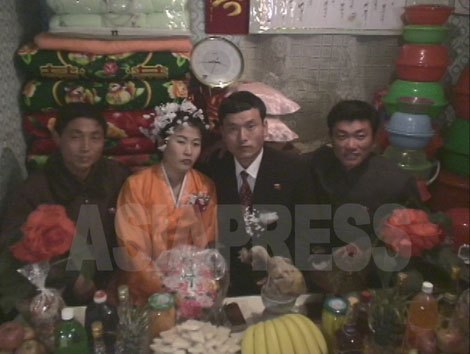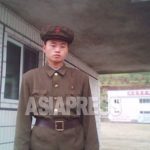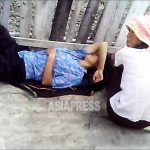
Over the past several years, the Kim Jong-un regime has carefully watched over the private lives of its citizens, but recently the regime has intensified its crackdowns on common law marriages, unmarried people living together, and even dating, calling these practices “non-socialist.” There have even been cases where North Koreans have been pulled in front of public trials and sentenced to 3-6 months of forced labor. These days, many North Koreans are avoiding marriage due to increasing financial hardships and, given the fact that women have a broader awareness of what they want from their lives, ideas toward traditional marriage and family life are rapidly changing in the country. This appears to have led the North Korean authorities to take strong measures to prevent the existing social fabric from falling apart. (KANG Ji-won / ISHIMARU Jiro)
◆ Young N. Koreans aren’t getting married due to financial hardships
An ASIAPRESS reporting partner in Yanggang Province, “A,” provided the following report.
“Up until the start of the COVID-19 pandemic, there were a lot of people who would wear traditional Korean clothing and take their marriage photos in front of statues of Kim Il-sung and Kim Jong-il. Now, nobody does that. Young people, particularly women, believe it’s wiser not to get married. Young people claim that they don’t need children and they should just focus on earning money. That’s because life is so hard right now and, for women, getting married means getting pulled down by considerable burdens. There is an increasingly number of people who refrain from getting married and either just continue dating or engage in common law marriages while living together.”
“A” is a single mother who divorced her husband and is raising her middle school-aged daughter on her own.
The authorities are frustrated at the rise in the number of people who are avoiding marriage and refusing to have children. They have designated common law marriages and couples living together without getting married as “non-socialist behaviors” and, starting in March, have implemented harsh crackdowns on these practices.
“A” told ASIAPRESS that “my neighborhood watch unit (inminban) informed us that unmarried couples should not live together. The authorities are demanding that people report any couples who are living together without registering a marriage. For example, a woman who lives with a single unmarried man, or even a woman who just visits a man’s house, can be accused of engaging in ‘non-socialist’ behavior.”
※ Inminban are North Korea’s smallest administrative units and are typically made up of 20-30 households. Inminban receive orders from local district offices and monitor the lives of the households under their remit.

◆ Exposing the “non-socialist” acts of common law marriages and unmarried couples living together
The organization at the forefront of this recent crackdown on young people is the Socialist Patriotic Youth League. The youth league is condemning unmarried couples living together and ordering such couples to at least register their marriages if they are unable to hold marriage ceremonies due to a lack of money. The youth league is threatening unmarried couples that if they do not register their marriages during a certain period, they will be punished for engaging in illegal common law marriages.
※ The Socialist Patriotic Youth League is an organization for young people under the Workers’ Party of Korea. Broadly speaking, the organization is made up of laborers and students under the age of 30.
“Young people these days can’t even date properly. The authorities make an issue of unmarried young couples living together in the same house, even making trouble for couples who visit each other’s homes.
“An increasing number of boyfriends are living together with their girlfriends at the home of the girlfriends’ parents. Parents can no longer earn money because of the bad economy, and thus can’t afford to help with marriage preparations. Parents are forced to do things in the way demanded by the young generation. There’s even cases where boyfriends are treated like sons-in-law by the parents and engage in business activities together. The authorities are not happy about this, either.”
What is the legal foundation for North Korea to deem common law marriages illegal? North Korea’s “Family Act” (revised in December 2009) has the following articles:
“Two people cannot live together without first registering a marriage.” (Article 11)
“Relations between a husband and wife require marriage.” (Article 16)
The law does not state anywhere that unmarried couples should not live together. However, the authorities are nonetheless cracking down on that practice as being “non-socialist.”
◆ People are dragged in front of public trials for dating while involved in divorce proceedings
It is difficult to get a divorce in North Korea. The authorities do not easily acquiesce to requests for divorces. Couples who fall apart typically live separately before a divorce is finalized, and there are frequent cases of these couples dating or living with others before a divorce is recognized by the government. However, the authorities believe that these practices disrupt the socialist order and have begun handing out punishments. There are even cases where people are pulled up in front of public trials to set examples for others.
“B,” a female reporting partner in Hyesan, told ASIAPRESS about an incident that occurred among people she knew.
“There’s been a considerable number of people who have gotten investigated around me. A lot of women living alone have gotten punished. They have been pulled up in front of public trails and given sentences of forced labor.
“In Hyesan in mid-March, a man living with another woman who was in the midst of a divorce was reported to the police and taken away. His case was investigated for just three days before he received a punishment of six months of forced labor at a labor brigade. In short, the woman was considered a concubine by the authorities.”
※ Labor brigades are “short-term forced labor camps” where people who have disrupted social order or have committed light crimes are sent to without trial proceedings for up to a year. Police departments manage these camps.
◆ Couples are being punished for violating quarantine rules
There are also cases where the authorities punish people dating or living together without being married for violations of COVID-19 quarantine rules.
Even now, North Korea is strongly restricting movement between different counties and cities as part of efforts to prevent the spread of COVID-19. People who visit the home of a lover or live with their girlfriend or boyfriend are being punished for violating quarantine rules.
According to “B”: “A woman in the middle of divorce proceedings in Hyesan’s Wuiyon-dong and her lover were investigated for breaking quarantine rules while living together at the woman’s house. This happened recently. The man also has a family and the divorce proceedings didn’t go as planned, so the woman was still considered married under the law. The authorities sentenced them to three months of forced labor for the ‘crime of concubinage.’”
There are many single women who receive financial help from married men they date, and the authorities are cracking down on the practice as “concubinage unfit for socialism.”
※ ASIAPRESS communicates with its reporting partners through Chinese cell phones smuggled into North Korea.
A marriage ceremony held in an urban area of North Hamgyung Province. A video of the marriage ceremony, which took place in 2006, was acquired by ASIAPRESS.
- <Inside N. Korea> “Just one piece of laundry soap and a couple kilograms of corn…” ASIAPRESS asks N. Koreans about the special rations for Kim Il Sung’s birthday
- <Interview with N. Korean> Conducts mass mobilization to farming communities: “People are being ordered to increase grain production to the death”… Even farmers are suffering from lack of food
- <Investigation> Changes in how young people view military service: “Why do we need to become soldiers if we’re a strong country with nuclear weapons?”
- <Interview with Two N. Korean> The 1.4 million young people petitioning for the military was just for show…they know they won’t have to join up to fight against the Americans and South Koreans
- <Inside N. Korea> Laborers forced to begin group commutes to work while singing in what appears to be the regime’s efforts to strengthen control over the people

























